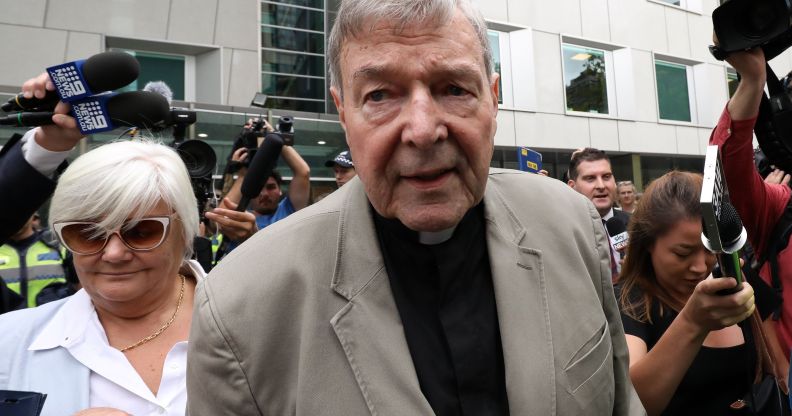Media to face trial for breaching reporting restrictions in George Pell child sex abuse case

Homophobe George Pell was the most senior Catholic figure ever to go to jail for child sex crimes. (AFP/Getty/BRENDON RATNAYAKE)
Australian media will face contempt of court charges for allegedly breaching a suppression order in the case of Cardinal George Pell, who was found guilty of child sexual assault in February.
The group, constituting 21 publications, 19 individual journalists and six corporate groups, will go to trial in November.
George Pell, 78, was acquitted on appeal last month and freed from prison, walking free after Australia’s court of appeal overturned his conviction for child sexual abuse.
The former Vatican treasurer, who has a long history of anti-gay statements, had maintained his innocence since being charged by police in 2017.
At a hearing of the administrative court in Melbourne today, the court heard that the county chief judge, Peter Kidd, had imposed a suppression order on 25 June 2018 over Pell’s trial, to prevent “a real and substantial risk of prejudice to the proper administration of justice”, the Guardian reports.
This was because Pell was facing a second trial, on separate charges. Despite the suppression order, when Pell was convicted in December 2018 numerous publications in Australia and overseas reported the verdict before the suppression order was lifted.
It is said that this risked the integrity of the second trial.
Representing the defendants, Matthew Collins QC said “the respondents are very anxious for these matters to be resolved finally”.
“It’s been hanging over their heads for far too long,” he added.
The court today heard from public prosecutor Lisa De Ferrari SC, who said that one trial should be held for all of the defendants.
“We certainly don’t see any problem since it is a trial before a judge, and everyone is represented by the same lawyer, for everyone to go ahead at one time,” she said.
“The judge can discern which evidence is related to which respondent.”
But Collins argued that there should be separate trials for separate media organisations and journalists.
“It would do an injustice to require journalists from rival news organisations to face trial at the same time in respect of allegations that would never ordinarily be heard together, just because they have [their occupation] in common,” he said.
The judge asked the parties whether they had considered splitting the trial instead into penalty and liability hearings.
“There’s probably no point in considering questions that go into penalty until the extent of liability is resolved,” he said. “Things like extent of circulation, and circulation outside of Victoria.”
The matter remains unresolved and has been adjourned until July.

